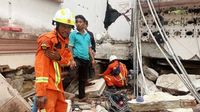On March 28, 2025, a powerful earthquake with a magnitude of 7.7 struck Myanmar, causing widespread devastation and a significant loss of life. The military government of Myanmar reported that at least 144 people have died and 732 have been injured as a result of the quake, which occurred at 12:50 PM local time in central Myanmar. A 6.4 magnitude aftershock followed shortly after, adding to the chaos and destruction.
The epicenter of the earthquake was near Mandalay, Myanmar's second-largest city, which has a population of over 1.5 million. Reports indicate that nearly every building in Mandalay collapsed, with university buildings burning down, the airport sustaining major damage, and the historic Ava Bridge now submerged in water. Eyewitness accounts describe scenes of panic as mosques and other structures fell while worshippers were present. "We were praying when the shaking began," one eyewitness told Reuters, highlighting the dire circumstances faced by many during the disaster.
In Naypyidaw, the capital located about 250 kilometers south of Mandalay, at least twenty deaths have been reported, with many more injuries. The military junta has declared a state of emergency in six regions, acknowledging the severity of the situation. Local media have reported that five people died in a monastery collapse in Taungoo, while ten fatalities occurred when a mosque in Mandalay crumbled.
The response from the military government has been notable; they have called for international assistance, which is a rare move for a regime that has historically shunned outside help. Junta leader Min Aung Hlaing stated, "I am asking every country, every organization for help," signaling the immense impact the earthquake has had on the nation. Humanitarian organizations, including the Red Cross, have expressed concerns about potential dam failures in the Irrawaddy River due to the earthquake, further complicating rescue efforts.
With over three million people already displaced by ongoing armed conflicts since the military coup in 2021, the earthquake's timing could not be worse. Joe Freeman from Amnesty International commented, "This earthquake could not have come at a worse time for Myanmar," emphasizing the urgent need for humanitarian aid as the country struggles under the weight of both natural and man-made disasters.
In Thailand, approximately 1,000 kilometers away, the earthquake's effects were also felt. An apartment complex under construction in Bangkok collapsed, resulting in at least three deaths and leaving 81 people trapped under the rubble. The Thai Minister of Public Health reported that 409 construction workers were on-site during the incident, with many still unaccounted for. Rescue operations are ongoing, and authorities are using drones to locate survivors among the debris.
The tremors were felt beyond Myanmar and Thailand, reaching parts of China, where the earthquake was reported in Yunnan province, and even as far as Cambodia, Bangladesh, and India. In Ruili, a city just across the border from Myanmar, injuries have been reported, and damage to buildings has been noted. The shockwaves were felt in several cities in southwestern China, including Kunming, which is home to 8.5 million residents.
As the situation develops, the full extent of the damage remains unclear. Hospitals in Naypyidaw are reportedly overwhelmed with casualties, and many people are being treated outside emergency rooms due to the influx of injured individuals. "The hospital in Mandalay has five hundred ICU beds, which are all already full," stated a doctor from a local facility. The influx of patients is further complicated by the ongoing civil conflict, which has made access to medical care and information difficult.
The international community is beginning to respond, with India and the Southeast Asian bloc ASEAN reportedly pledging aid to Myanmar. However, the military's long-standing refusal to allow humanitarian assistance in areas where resistance groups are active raises concerns about the effectiveness of any aid efforts. Amnesty International has called for immediate, unrestricted access for humanitarian organizations to assess needs and provide assistance, stressing that human rights must remain central to all aid efforts.
Pope Francis expressed his deep sorrow over the devastation caused by the earthquake, offering prayers for the victims and those affected by the disaster. His statement reflects the global concern for the humanitarian crisis unfolding in Myanmar and the urgent need for assistance.
As rescue operations continue, the situation in Myanmar remains fluid and precarious. The military junta's call for help could be a turning point, but the challenges of navigating a humanitarian response in a country marked by repression and conflict will require careful consideration and coordination.
With the full impact of the earthquake still being assessed, the focus now shifts to rescue efforts, humanitarian aid, and the long-term recovery of a nation already in turmoil.







